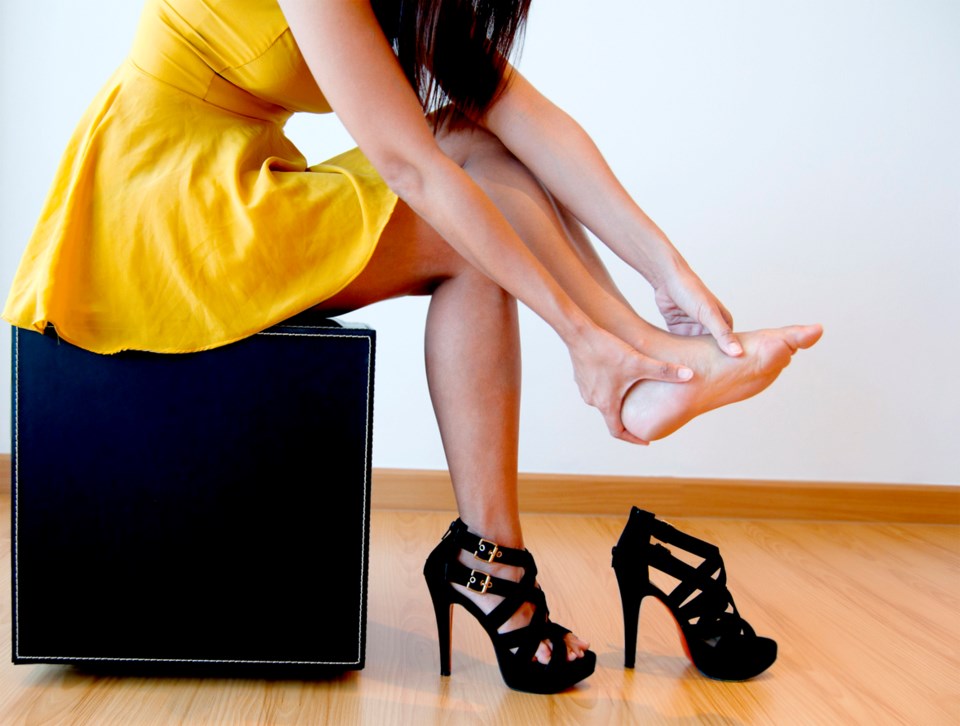As the mother of two daughters who wore high heels to work in a restaurant, Deb Treloar gave them “the talk” — the physiotherapist talk.
Treloar, a partner and physiotherapist at Treloar Physiotherapy, knew that her daughters’ shoes were not good for their bodies.
High heels lead to foot problems such as neuropathy (nerve damage) and bone bruising. By changing and restricting the way your foot hits the ground, they adversely affect other parts of the body as well.
But her daughters went to work in high heels any way.
“I’ll be fine,” they told their mother.
“Young women are not at a good age to question [work requirements that require them to wear high heels],” Treloar says. “They want the job and need the money. [High heels] are also a look and they’re at an age where how they look is paramount.”
On March 8, Green Party MLA for Oak Bay-Gordon Head Andrew Weaver introduced Bill M237 — Workers Compensation Amendment Act 2017. If passed it will prevent employers from requiring certain staff members to wear high heel shoes at work. “This footwear can be extremely uncomfortable and unsafe,” he said when he tabled the bill.
On the weekend, Premier Christy Clark tweeted her support of the initiative.
“Women shouldn’t have to wear high heels at work. We’ll move to end this,” she said.
Last year, the Ontario Human Rights Commission issued a report that said work dress codes that require women to wear high heels and short skirts “reinforce stereotypical and sexist notions about how women should look… Employees may feel pressure to agree to sexualized dress requirements to get a job or because they fear losing tips, shifts or even their jobs.”
When Ian Tostenson, the president and CEO of the B.C. Restaurant and Food Services Association, heard rumblings about the B.C. proposal, his first reaction was, “We don’t need any more regulations.”
But now he’s in favour because it turns a requirement into an option and gives female staff the freedom to wear high heels if they want.
It’s also been argued that carrying heavy trays while balancing on high heels is not safe.
“WorkSafeBC does not have statistics specific to injuries caused by the wearing of high heels at work,” says spokesperson Trish Knight Chernecki. “What we can tell you is that 30 per cent of accepted injury claims for female and male servers working in restaurants, pubs, bars and nightclubs were caused by slips, trips and falls.”
The Workers’ Compensation Act requires employers to ensure the health and safety of their workers and remedy any workplace conditions that are hazardous to their workers’ health or safety.
Two or three years ago, Tostenson says there might have been negative feedback about the bill, but “the restaurant industry has moved ahead.”
Earls Kitchen + Bar changed its heels policy years ago, says Kristin Vekteris, the restaurant chain’s vice-president of brand and marketing. Its dress policy does call for a minimum one-inch structured shoe but that is for safety reasons such as protecting feet from broken glass.
“We want our partners to be comfortable and happy,” says Vekteris, who says most female staff choose to wear wedge shoes or booties for comfort. “We want them to have some choice but we also want them to be safe.”
Earls also changed its dress code last year to allow female wait staff to wear pants, a move that was very much appreciated during the winter months.
At Treloar Physiotherapy, Deb Treloar says that people need to remember the foot is the base of our support and “it has to move the way it’s supposed to move.” Many types of footwear, including high heel shoes, restrict that movement. “I have a patient who’s just as much troubled with her feet because she has to wear steel-toed boots.”
As for her daughters, who no longer work in the restaurant industry, they are like many women who prefer to wear heels when they go out to dinner knowing they will be able to spend most of the evening sitting down.
mperkins@vancourier.com



